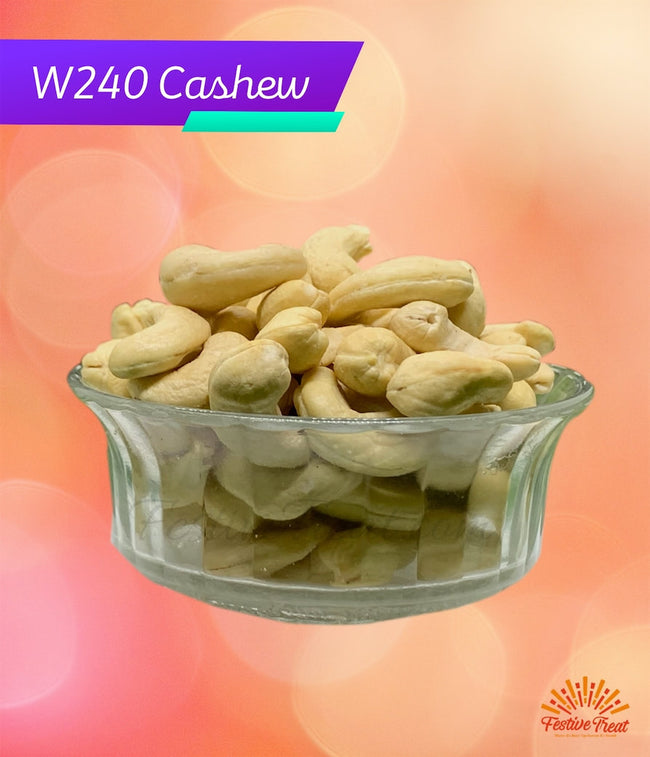Grade W240 Cashew
Cashew nut is one of the dry fruits. They are suitable for vegans. It is free from sugar and all sorts of preservatives. It is an entirely natural product and is gluten-free as well.
They are perfect for gifting your loved ones during various festivals, especially Diwali. It is known for boosting energy; hence they are ideal for consuming while observing fast.
GRADE: W240
Depending on the cashews' size, shape, and quality, they are divided into different grades. W signifies that the cashew is 'whole' and not split or broken.
The number accompanied to it tells the amount of nuts per pound. Lower the number larger the cashew. W240 grade nuts are large and have a pale ivory color.
They are referred to as jumbo nuts.
NUTRIENTS (100 GRAMS)
The major part of the cashew nuts consists of fat that is about 44g; later followed by carbohydrates (33g) and protein (18g). It also contains about 3g of fiber and 2g of other substances.
|
Nutritional values per 100 Grams
|
|
Fruit
|
W240
Cashew
|
|
Calories
|
557
|
|
Glycemic Index
|
24
|
|
|
Quantity
|
% Daily Value*
|
|
Energy
|
785 KJ (187 kcal)
|
|
Total Fat
|
45 g
|
64%
|
|
Saturated fat
|
9 g
|
39%
|
|
Polyunsaturated fat
|
27.9 g
|
43%
|
|
Monounsaturated fat
|
29.3 g
|
45%
|
|
Cholesterol
|
0 mg
|
0%
|
|
Sodium
|
14 mg
|
0%
|
|
Potassium
|
667 mg
|
18.5%
|
|
Total Carbohydrate
|
29.8 g
|
8.9%
|
|
Dietary fiber
|
2.8 g
|
14.2%
|
|
Sugar
|
5.93 g
|
|
|
Protein
|
16.5 g
|
31.9%
|
|
Vitamins
|
|
Vitamin A equivalent
|
0 mg
|
0%
|
|
beta-Carotene
|
0 μg
|
0%
|
|
lutein zeaxanthin
|
21 μg
|
0%
|
|
Thiamine (B1)
|
1.2 mg
|
5%
|
|
Riboflavin (B2)
|
0.57 mg
|
1.2%
|
|
Niacin (B3)
|
1.036 mg
|
4%
|
|
Pantothenic acid (B5)
|
0.89 mg
|
15%
|
|
Vitamin B6
|
0.4 mg
|
8%
|
|
Folate (B9)
|
26.2μg
|
7%
|
|
Vitamin B12
|
0 μg
|
0%
|
|
Choline
|
6.5 mg
|
2.5%
|
|
Vitamin C
|
0.2 mg
|
0%
|
|
Vitamin E
|
5.1 mg
|
6%
|
|
Vitamin K
|
650 μg
|
78%
|
|
Minerals
|
|
Calcium
|
36 mg
|
3.4%
|
|
Copper
|
2.362 mg
|
2%
|
|
Iron
|
6.83 mg
|
26%
|
|
Magnesium
|
294 mg
|
76%
|
|
Manganese
|
0.829 mg
|
27%
|
|
Phosphorus
|
598 mg
|
57%
|
|
Potassium
|
664 mg
|
64%
|
|
Selenium
|
1.3 mcg
|
4.3%
|
|
Sodium
|
11 mg
|
0%
|
|
Zinc
|
5.49 mg
|
9.8%
|
|
Other Constituents
|
|
Water
|
2.72
|
|
Lycopene
|
0
|
|
*Per cent Daily Values are based on a 2,000 calorie diet. Your daily values may be higher or lower depending on your calorie needs.
|
|
Units : μg = micrograms, mg = milligrams, IU = International units
|
|
†Percentages are roughly approximated using US recommendations for adults. Source: USDA Nutrient Database
|
ALLERGIC CONTENT
It is a potent allergic food that might trigger various immune reactions that range from moderate to critical.
HOW TO USE
These nuts can be consumed by themselves without cooking or adding it to any other thing. They get along well with all kinds of dishes, be they spicy or sweet.
They add a crunch and life to India's most loved dish Biryani. They are also incorporated with a large number of sweet dishes like Sheer kurma, kheer, laddu, etc.
Savory food is also garnished with cashew nuts. They are a good companion of ice cream as well.
PREGNANCY
They are recommended to be eaten during pregnancy due to the presence of various nutrients suitable for the baby's development.
HEALTH BENEFITS
Cashew nuts are packed with a lot of nutrition and goodness.
In the metropolitan environment with its over-the-top contamination, our eyes face various ill effects. They contain 'Zea Xanthin,' a fantastic antioxidant, and our retina absorbs it readily.
A defensive layer is formed by the antioxidant, which protects our eyes from harmful ultraviolet rays.
It is also found that macular degeneration in the older generation is kept at bay by the regular consumption of these nuts.
Iron is vital for the formation of red blood cells in the body; the nuts contain an ample amount of iron which reduces the risk of Anemia. Iron is also required to produce certain hormones in the body.
They contain oils that enhance your skin due to the presence of selenium, zinc, and some antioxidants.
The considerable amount of selenium present in it takes care of the free radicals that are known for causing cancer.
Anti-diabetic properties are seen in cashew, which makes it ideal for people having diabetes. The monounsaturated fats and polyunsaturated fats present in these nuts help to fight bad cholesterol and thus, reduce the risk of having heart-related diseases.
They contain magnesium which is not only good for the skin but also known to relax heart muscles thus, reducing the chances of having high blood pressure.
Consumption of these nuts keeps your stomach full, and they also aid in good metabolism.
STORAGE AND SHELF LIFE
Cashew nuts easily last up to half a year if stored in a place without moisture.
If you have opened the packet, then make sure to store them in a container that is airtight; otherwise, you will lose the cashew's crunchiness.









